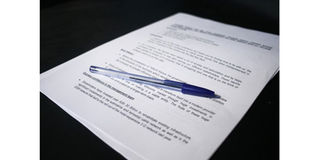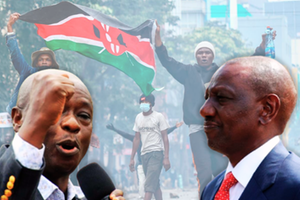How I got it wrong and ended up with a 10-page CV at age 22!

A copy of a CV.
What you need to know:
- It was until I was 23 that I sat in my first CV writing class. That is your cue – if you can’t write your own CV to save your life, you might consider investing in training.
- The job market is very competitive, so here is how to avoid making such blunders, which could potentially cost you an opportunity.
Last Friday, a colleague received a CV from a fourth-year journalism and mass communication student, hopeful for an internship placement.
In the two-page CV, my colleague was listed as one of the referees – his name, title and contact in bold and underlined, for emphasis.
However, this student got the name of the organisation and the job title of my colleague wrong. In other words, she did not know where her chief referee works or what he does.
Before I continue, here is how to avoid making such blunders, which could potentially cost you an opportunity. It is nothing extraordinary. “Hi, I would like to list you as my referee. What is your current company and job title?”
Does that message sound like one you can write? Your answer is irrelevant. I have a reason. You do not have the option of whether or not to inform your referees that you have added them to your CV as references.
The rule of thumb is that the referees you list must have interacted with you professionally and know you have listed them on your CV.
My colleague and I laughed at the fact that the CV owner didn’t even know where he works, yet expected him to spend his professional currency on them. But even as we laughed, and gasped at such audacity, I remembered my first attempt at writing a CV.
I was 19 years old at the time, taking an attachment. And because I did not have much else to write, I had a long list of what I know now to be dead information on a CV – marital status, religion, postal address, date of birth… my primary school marks, and more. So no, I am not just doing bad press for the Gen Z.
Also read: When did you last update your CV?
Writing a CV when you have minimum experience can be a challenge. I thought a future employer would be interested in my birth date because if I did not tell them about my birth date, there would be nothing else to write about.
I probably also thought the fact that I was 19 would make the potential employer have mercy on me. Well, I don’t know if that works.
As I got older and started gaining professional experience, the next problem then became filtering, summarising, and communicating my experiences.
I was happy I had attended workshops, was writing for an art journal, was moderating film forums -- and somehow, all these stories, I felt, needed to be in my CV. That is the story of how I ended up with a 10-page CV when I was 22!
It was until I was 23 that I sat in my first CV writing class. That is your cue – if you can’t write your own CV to save your life, you might consider investing in training. But even before you go that far, we have free online tools you can start with like YouTube tutorials. Or request your older sibling or cousin to help you – ask nicely, you need their help.
When I understood how to communicate with clarity through my CV, it started to make sense why I applied for certain opportunities and the feedback was something along the lines of “we have reviewed your CV… Our preference is someone with ABC skills” to which I would scream at the email: “I HAVE THOSE SKILLS.” Only they were not indicated on my CV!
What am I saying in a nutshell? The world today is very competitive, but that is not news. It is generally a bad idea to not invest in your own growth. Ask questions, google, or read books.
To use a line my friend, Martha, used in our last conversation: “There are mistakes people can overlook when you are (18). But when you still make the same mistakes when you are (25) people will start to look at you again.”
The writer is the research editor, NMG ([email protected]).





